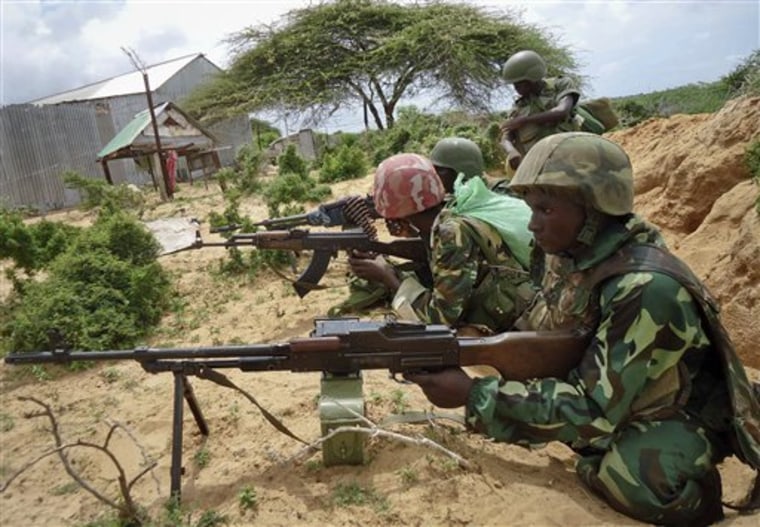Thousands of people fled a camp for the displaced near Somalia's capital on Sunday, fearing an imminent clash between African Union peacekeepers and the al-Qaida-linked militants who are trying to demonstrate their strength amid an assault on two fronts.
In the country's south, meanwhile, others braced for fierce battles as Kenyan soldiers closed in on a militant-held town in their weeklong effort to defeat the al-Shabab group blamed for suicide bombings, kidnapping foreigners and killing famine victims.
African Union forces already have pushed the militants from their last base in the capital of Mogadishu, and those staying on the outskirts said they worried the battles were approaching. The African Union Mission to Somalia force, also known as AMISOM, said in a statement Sunday they had advanced to Mogadishu's outskirts.
"We want to pass here before the fighting closes the escape routes," said Salado Abdullahi, a mother of six, who was at a checkpoint in Mogadishu on Sunday.
Somalia has been a failed state for more than 20 years, and the lawless country is a haven for pirates and international terrorists. Al-Shabab fighters have been waging a war against the weak Somali government for more than five years.
A force of 9,000 peacekeepers from Burundi and Uganda have been aiding the Somali forces. Al-Shabab retreated from Mogadishu amid a devastating famine a few months back, but re-emerged by staging their deadliest single bombing that killed more than 100 people.
On Sunday, a suicide bomber killed himself and wounded two AU troops when he ran after the AU convoy.
The Kenyan military sent troops into neighboring Somalia one week ago to pursue the militants following a string of kidnappings on Kenyan soil that were blamed on Somali gunmen. Al-Shabab has threatened to launch suicide bombings inside Kenya in retaliation, and the U.S. Embassy warned late Saturday than an imminent terrorist attack is possible.
Kenya's military spokesman Maj. Emmanuel Chirchir said fighting was a likely to occur in the town of Afmadow "very soon."
"Most likely man-to-man battles will occur in Afmadow," he told The Associated Press. "That is one of the areas we really want to inflict trauma and damage on the al-Shabab basically to reduce their effectiveness completely so that they do not exist as a force."
Hundreds of residents were fleeing Afmadow Sunday in anticipation of fighting. Chirchir said al-Shabab were regrouping in the town of Bula Haji to face the Kenyan troops.
Somali gunmen have kidnapped four Europeans in the last six weeks — two from Kenya's Lamu coastal resort region and two from the Dadaab refugee camp near the Somali border. One of the hostages, a quadriplegic French woman, died on Wednesday.
The kidnappings have threatened Kenya's tourism industry, which had only recently bounced back from a near collapse after postelection violence left more than 1,000 dead several years ago.
Kenya's troops are untested and it isn't clear if they are prepared for a long-term occupation requiring counterinsurgency skills — a scenario that ended U.S. and Ethiopian interventions during Somalia's 20-year-old civil war. The Somalia operation is Kenya's biggest foreign military commitment since independence in 1963.
However, al-Shabab has been weakened by a severe famine in its strongholds. Al-Shabab also is beset by internal divisions and public discontent over the group's strict punishments, recruitment of child soldiers and indiscriminate bombings.
_____
Tom Odula reported from Nairobi, Kenya.
